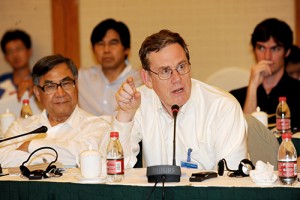“It helps us as world citizens to understand that these non-Western philosophies are alive with these ideas that change and shift and debate are not alien,” said Sharon Carstens, director of the Portland State Institute for Asian Studies and professor of anthropology and international studies at PSU.
The teachings of Confucius today
“It helps us as world citizens to understand that these non-Western philosophies are alive with these ideas that change and shift and debate are not alien,” said Sharon Carstens, director of the Portland State Institute for Asian Studies and professor of anthropology and international studies at PSU.

COURTESY OF peter bol
Harvard scholar Dr. Peter Bol will deliver a lecture at PSU. Bol is seen here at a 2011 conference at Peking University.
On Oct. 26, the institute—in conjunction with PSU’s Confucius Institute—will present a lecture by Dr. Peter Bol titled “Power, Wealth, and a Confucius for Today.” Bol, the Charles H. Carswell Professor of East Asian Languages and Civilization at Harvard University, aims to make Confucianism relevant to today’s global citizens.
Bol’s lecture will “take a look at China today to get an idea of how the discussion on national values is playing itself out,” he said.
While some Americans have at least a passing familiarity with the term Confucianism, knowledge of these teachings is pretty vague for the majority of Americans. The goal of this lecture is to bring a clearer understanding of various issues surrounding modern-day Confucianism as well as its ancient teachings.
Confucianism has dominated many Asian cultures for more than 2,500 years. It is based on an ancient Chinese school of thought and, though often labeled a religion, it more closely resembles a code of behavior within society and in relation to one’s ancestors. Confucianism is known to have as many political and social implications as it has religious ones.
The philosophy takes its name from Confucius, a teacher who lived in China around 500 B.C. He promoted the belief that there is a system of order to all things in the universe, including human society, and that to maintain this social order it is necessary for every person to know his own proper place within this society and to strictly observe the rules of his position. This type of society is governed by individuals specially trained in Confucius’ traditions, and its customs are strictly observed by all members of the society.
In modern times there has been debate over whether or not Confucianism is as strong today as it once was and, if so, what it means—not only for Asian cultures but for the world in general. These are some of the issues Bol will address in his lecture.
Bol is a renowned scholar of neo-Confucianism and Chinese history whose research is centered on the history of China’s cultural elites from the Tang, Song, Yuan and Ming dynasties. He has led Harvard’s university-wide effort to establish support for geospatial analysis in teaching and research; in 2005 he was named the first director of the Center for Geographic Analysis.
Bol also directs the China Historical Geographic Information Systems project, which is a collaboration between Harvard and Fudan University in Shanghai to create a GIS for 2,000 years of Chinese history.
In collaboration with Harvard, Academia Sinica and Peking University, he directs the China Biographical Database project, an online relational database of, currently, 112,000 historical figures. Bol is also the author of “This Culture of Ours”: Intellectual Transitions in T’ang and Sung China and Neo-Confucianism in History.
Carstens was instrumental in bringing Bol to PSU. She first learned of Bol through his books on neo-Confucianism and Chinese history. She was impressed by the well-defined and fascinating manner in which he discussed the history and teachings of Confucianism.
“Power, Wealth, and a Confucius for Today”
A lecture by Dr. Peter Bol
Friday, Oct. 26, 6:30 p.m.
Lincoln Hall, room 75
Free and open to the public
His discussions on Confucianism bring to mind “connections between the various political debates that were going on in that time and the political debates that are happening right here in the United States,” Carstens said.
PSU history professor Linda Walton, who assisted in bringing Bol to PSU, points out that as we see more institutes dedicated to Confucianism opening on a global level, there is a greater need for a detailed understanding of his philosophy and teachings.
“It is very useful to have an expert come discuss these traditions, allowing us to see the importance of the Confucian values,” Walton said.







Thank you for this invitation, I am happy to see PSU make the effort to pay attendtion on Confucius philosophy and its effect on current global publics, look forward to this evevt.